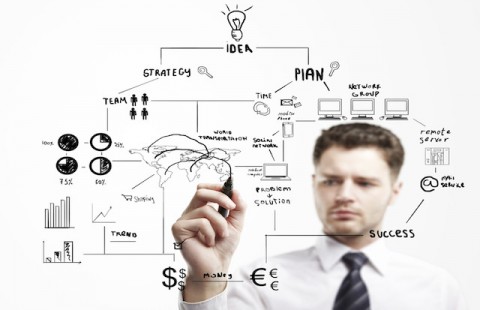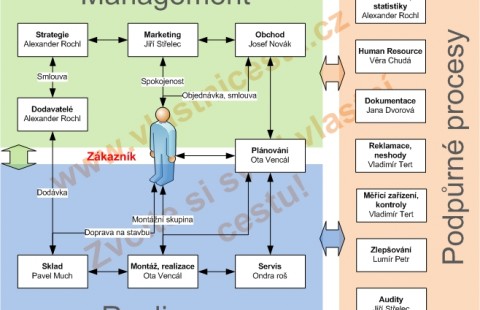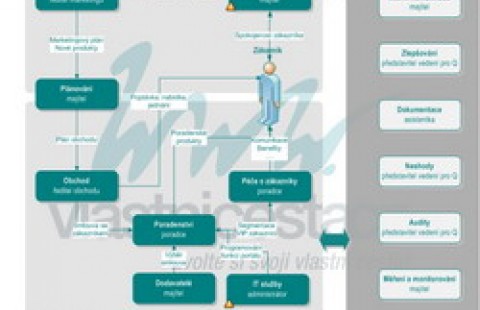Nowadays, the internal communication is regarded as a matter of course. After all, there are regular meetings, managers do communicate with their workers on a daily basis, and an awful lot of e-mails are sent every day. It does not mean, though, the internal communication works all right and noway it means it is correctly set to fulfil the company´s strategy.
Poor internal communication can have the policy fulfillment deferred
The company´s expansion and its existence is based on fulfillment of the policy prepared by the managers for a particular period of time. They will only succeed in fulfilling it, provided that it captures their imagination. Yet they have to make sense of it and **start practising it**. Assigning projects, tasks and watching them being fulfilled is just not enough. Managers are supposed to show direction, expectations and the way how to achieve them. In short, there is a lot to do, and regular, well-measured internal communication is paramount here. The internal communication should be made an integral part of the plan how to make the policy happen, see the figure.
It needs to be taken into account, and managers should reserve in their diaries the necessary time in which they will be doing it for real. Apart from planning the time needed for realizing the policy, investment, etc. technically, they should also plan some time for the key personnel to understand the need for a policy and how to fulfil it. This is a crucial part, as the managers do their work through the workers, and the workers in particular have to grasp the company´s policy correctly.
In a table, there is an overview of times to be spent on putting the individual managerial decisions to work, including the things to check up on.
| Lead time | Time for internal communication | Recommendations to verify the internal communication results | |
|---|---|---|---|
| A strategic decision | Months - years | Days |
Devote time to win loyalty + check up comprehension + check up the outputs |
|
A tactical decision |
Days - weeks | Hours |
Check up comprehension + check up the outputs |
| An operatitve decision | Hours - days | Minutes |
Check up comprehension |
Internal communication - a strategic management tool
The internal communication is one of the strategic tools being used to achieve an entrepreneurial intent and the current company strategy. This beautiful sentence, nonetheless, only works provided that the managers work with the internal communication regularly. It means there is a clearly set process of the internal communication (not just one paragraph in The Organization´s Manual or The Quality Handbook to say that the management is supposed to communicate crucial information to all the employees through holding regular meetings), there are pre-defined situations that need to be communicated including, obviously, the ways they will be communicated. A heavy stress is then laid on WHAT, WHEN, HOW, TO WHOM and WHY.

The Real | Interim Manager for Your Changes

Manager work model

Time management - making use of time effectively

Jak správně tvořit mapu procesů

Modelling and setting the processes and procedures - ISO 9001

Training - preparation of the SWOT analysis and strategy

Company Management System of Quality Step by Step - ISO 9001

Process map acc ISO 9001 - business offer

IT staff communication
However, in practice it often emerges that before the management comes to an agreement whether or not communicate, for instance, a 30% decrease in orders, the workers will have formed their opinion a long while before - such as the company´s bankruptcy is imminent, there will be lay-offs, etc. The smart ones have nothing to wait for, and unless there is an extra bond between them and the comany (besides the salary only), they will start search for a new job. While, in fact, it could have been just a temporary phenomenon (for example, a postponement of signing an agreement, a temporary wage freeze, etc.). The late communication tends to get worse with the company´s growing size, the managers´ incompetence and inexperience. A marked delay in communication also occurs in foreign-owned corporations. For it may take up to two months before all the required approval processes have been completed by the foreign-based management. At that time, little will they need to communicate anything more. On the contrary, the information they will bring is so outdated that the workers cannot but laugh at such a communicated decision.
On this occassion, I recall the words uttered by Vladimír Horáček, an associate professor, on how to kill a company as cheaply as possible - it is simple enough, all you have to do is to DO NOTHING! That holds especially true at the time of crisis when people have no chance to learn what exactly has happened, while having to provide for their families.
Personally, I would place maximum emphasis on HOW to communicate. Several times I have witnessed the situation when, owing to changes on the market the customers started to leave (possibly even because a new technology was made available on the market). In that case, if the manager announces that – „There will be new customers.“, „There will be enough work, we have a new dealer.“, nobody is simply going to be assurred things will go for the better. Particularly so, if the new dealer is unable to find new customers. At this stage the production manager is running out of arguments and appropriate sentences that they should communicate to their workers. Internal communication is simply a strategic part of a manager´s work. Even situations like this are solvable: it will suffice if you introduce regular presentations to inform people, even graphically, of the following, for example:
- Meeting the target and deviations – at times it is also discovered the target is being fulfiled better than the workers thought and than the rumours had it. Sometimes it is enough to stop investment, purchases, and the scheduled turn-over can decrease without affecting the workers or the necessity to reduce staff.
- The number of booking orders
- Engaging the secretariate in the search for new customers
- The number of prospective customers with contracts under negotiation, etc.
These are real activities and information which make one understand the unfavourable situation is being handled with competence. Simultaneously, they show the management being in their proper place and coping with the market crisis. Believe it or not, if things are done properly, the result follows. In addition, having taken the above steps, it is possible to ask other workers, considering the difficult situation quite a few Czech companies have been facing, to draw in temporarily.
Information has to be communicated THE WAY people think.
The management should definitely take into account the way of communication (HOW), as well as to whom is the information communicated. The way managers think is often different from the way workers do (they have to, otherwise they could not be managers), but the workers need to hear information their own way, not the way managers want.
Company owners who lose their temper like "well, I have yelled because of that at the meeting. I have told them several times!“ are being unrealistic. True, yelling and an extreme situation will leave people with unpleasant memories (people mostly remember impressions; 80%), but not with the information needed (people only remember 10% of an announcement). Moreover, an extreme situation creates resistance, barriers and inhibits listening. It will not help to win the necessary loyalty of a worker, so needful at the time of crisis. That brings me to another aspect of the internal communication – managers tend to consider things they have once mentioned done. They only see what they need to see, yet their workers do their work in the real environment and may not be regarding the information/message as being that important. In plain terms, the internal communication should have language corresponding to a particular group of workers it is intended for, and, be done regularly at meetings, for example, every week. Whether we like it or not, even the internal communication requires quality. If it is not of quality, it equals a waste of time that might backfire on you.
Conclusion
The internal communication is a strategic instrument designed to win the workers support in meeting strategic targets as well as their loyalty. Such loyal workers, then, can be fulfilling our strategy while contributing the added value through their expertise. World-class, top-notch managers are not just well-prepared people wearing suits, but those who regularly take their managerial suits off to mingle with workers in the construction site, etc. The same holds true with small companies, too. However, here, this role is taken up by owners.
Communication is a human affair, so it has to be dealt with in a human manner. In order to better the internal communication, I suggest the following course of action:
- Take advantage of the communication training – avoid making needless mistakes
- Have a clear process of internal communication or, in case of need, crisis communication ready
- Pre-emptively, define situations you are always going to communicate
- Pick out adequate tools of communication
- Establish the key workers or groups you are going to share information with first
- Specify the results you want to achieve in advance (always in keeping with your own strategy)
- Check whether the results have been achieved – indeed, that is what you are principally supposed to do, managers.
In conclusion, I have a little test for you to ponder on. For the third time in a row, the customers have complained to you about your dealer and want him or her to stop calling on them. Where and how are you going to communicate this information:
- I will warn the dealer to beware of troublemakers
- I will have that dealer on the carpet before the entire management
- At the sales meeting, before all the participants, I will warn them of their inappropriate behaviour towards the customers
- I will check particular orders and draw the dealer´s and the other workers´s attention to the need of appropriate communication with the customers
- I will terminate contract with the dealer

